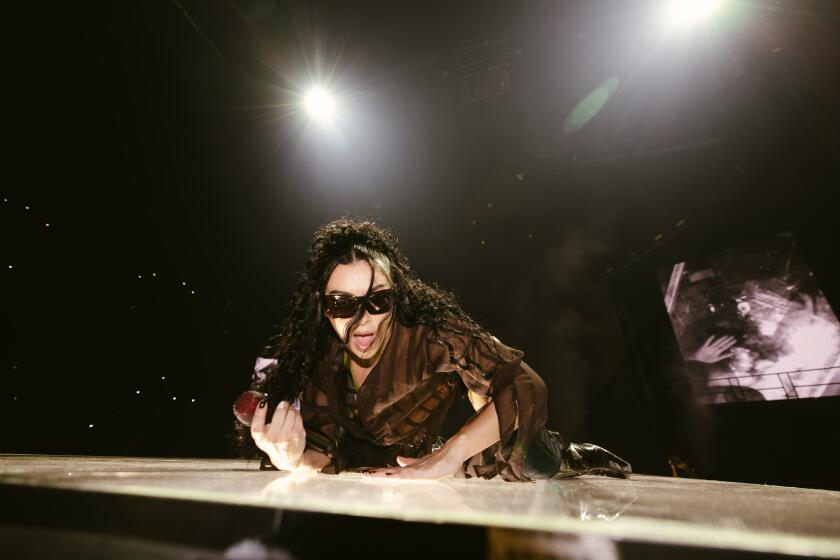Solace sought, and offered, by Tori Amos
- Share via
The old saying goes that if you want to get someone’s attention, whisper. But when singer-pianist Tori Amos tried that at the Universal Amphitheatre on Tuesday, she couldn’t be heard above the capacity crowd’s shouts of admiration.
Amos, who offered only a few between-song words throughout the two hours and 15 minutes, appeared to be conserving her voice, which sounded slightly ragged the first time she spoke.
Her singing, however, was typically powerhouse, shifting easily from operatic to breathily intimate to guttural and growling. Indeed, even when hushed it commanded attention, so it’s not surprising that she ended up singing an explanation of why she was performing under a “Roadside Cafe” sign during a brief solo-piano turn.
That setting tied into the concept of Amos’ current album, “Scarlet’s Walk,” which follows its title character through a journey of discovery. Such numbers as the sprawling, propulsive “A Sorta Fairytale” and the wistful ballad “I Can’t See New York” represent the sort of epic yet personal exploration that is her trademark and which inspires the irrepressible devotion of those who find her music both soothing and cathartic.
When she arrived in 1991 with “Little Earthquakes,” that sense of comforting fury came from Amos’ ability to angrily confront trauma and affirm her survival. “Scarlet’s Walk” allows for anger but focuses more on seeking solace, though the lush music is still suffused with melancholy.
Planted as usual between her shiny black Bosendorfer piano and a pair of stacked keyboards, Amos was at times positively voracious, writhing on the bench and rocking to the sensual flow of new songs and older material.
Bassist Jon Evans and drummer Matt Chamberlain provided essential grooves and agile beats that fleshed out the songs and emphasized the tunes’ erotic rhythm, making them more accessible to the casual fan or new listener. Although their contributions were key, the extra color and texture ultimately didn’t counteract the set’s pervasive pensiveness, which proved wearying even to some of the faithful.
More to Read
The biggest entertainment stories
Get our big stories about Hollywood, film, television, music, arts, culture and more right in your inbox as soon as they publish.
You may occasionally receive promotional content from the Los Angeles Times.










